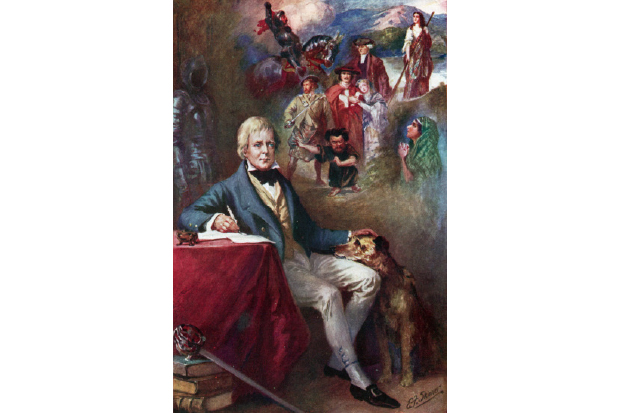More brides in Britain go down the aisle to Gloria Gaynor’s ‘I Will Survive’ than to any other tune, Simon Loveday notes. He cannot resist adding that ‘it seems doubtful that they have fully taken in the words of the rest of the song’. That must be true. ‘I’m not that chainedup little person still in love with you,’ yells the defiant narrator in Gloria’s song. ‘You’re not welcome anymore.’ If anything, ‘I Will Survive’ belongs, it seems to me, to a genre of assertive anthems, like ‘My Way’ and ‘Invictus’, that appeal to people who are the imaginary heroes of their own Desert Island Discs and examine their lives as little as the lyrics that make them feel better.
So why does the author bring up this detail of the modern British marriage ritual? Because, for the brides, he says, this song ‘may be only a piece of rock music, but the resonance with the Psalms has not escaped them’. I’d have thought this very unlikely indeed. Many brides, and grooms, are utterly unfamiliar with the Psalms, unless they have by chance run into ‘The Lord’s My Shepherd’. But his larger point is that ‘I Will Survive’ shares with religion a language of ‘high seriousness’.
Such high seriousness is exemplified, he says, by something Emily Dickinson wrote about the only way to recognise poetry: ‘If I feel physically as if the top of my head were taken off, I know that is poetry.’ One knows what she means, but it is a pretty useless litmus test. It would exclude most of Pope, much of Browning and long stretches of epic poetry. Of course, she might have retorted: ‘That is — not what — I call poetry.’ But it doesn’t help Loveday’s next generalisation: ‘Anyone who examines religious language is going to find that it evokes feelings of solemnity and awe.’
That is a question-begging principle that rules out acres of the Book of Numbers, for example, or the letters of St Paul. If you define religious language subjectively as awe-inspiring, then many people in practice omit the whole Bible. They don’t read it. That’s why they plump for Gloria.
Loveday’s look at the ‘Good Book’ (a folksy name for the Bible first used, I think, by John Wesley during his disastrous spell in Savannah, Georgia in the 1730s) is at its most engaging when he tosses up such literary-critical propositions for discussion. He spent more than a decade on his book, he tells us, while working as Senior Associate at Keele School of Medicine, ‘helping to design and deliver leadership and change management programmes for Foundation Trusts’.
I found that he packs too much in — or rather he packs the wrong things for an enjoyable holiday. Forget the barometer; it’s more fun with the bucket and spade. I don’t insist on feeling as if the top of my head were taken off, but I might well blow my top if someone tries once again to explain the relation between the supposititious Q Source and the Gospels of Mark, Matthew and Luke.
Even more futile is the distinction that Loveday embraces between the Jesus of History and the Jesus of Faith. ‘This book is not intended to examine the Christ of Faith: it can speak only of the Jesus of History.’ The trouble is that, after a criterion is applied that excludes the marvellous and mythical, the Jesus of History, like the hunter of the Boojum, softly and suddenly vanishes away. But then, ‘the writers of the New Testament’, he asserts, ‘had no interest in the historical Jesus.’
I’m not so sure about that. But Loveday does not keep to his promise of speaking only of the Jesus of History. Taking sample passages, he examines their literary conventions. One is the passage in Mark that recounts Peter’s denial of Jesus and his subsequent repentance. ‘I make no comment on whether or not it happened,’ he declares. ‘But it is entirely realistic; it could be out of EastEnders or the Archers.’ High praise, but is it so?
Peter, if you remember, is tricked into denying Jesus, who is under arrest, when he is warming himself by the fire along with the servants of the high priest. But this is only accidental realism. The reader does all the work to construct an imaginative picture. In the Iliad, when Hector’s baby son is frightened by the horsehair crest on his helmet, we regard it, perhaps, as a masterly literary detail. But what if Peter, the historical Peter, simply did warm himself at the fire on the night of Jesus’s arrest? Then it is not, after all, a brilliant device to reveal his character in a realistic setting, even if Loveday attributes its presence to the ‘groundbreaking novelty of the way the Gospel writers constructed their stories’, treating ‘ordinary lives with seriousness and depth’.
Loveday sometimes asserts things that aren’t true. More than once he says that Muslims, Jews and Christians ‘describe themselves as “people of the book”’. In reality, it is a term used in the Quran, often polemically, of Jews and Christians: ‘O people of the Book, why do you not believe in God’s signs?’ But Loveday’s big mistake is to think that it is possible to ‘set aside theology and history’ and be left with anything in the Bible, except by accident, that is more ‘grown up’.
The post The gospel truth appeared first on The Spectator.
Got something to add? Join the discussion and comment below.
Get 10 issues for just $10
Subscribe to The Spectator Australia today for the next 10 magazine issues, plus full online access, for just $10.
You might disagree with half of it, but you’ll enjoy reading all of it. Try your first month for free, then just $2 a week for the remainder of your first year.














Comments
Don't miss out
Join the conversation with other Spectator Australia readers. Subscribe to leave a comment.
SUBSCRIBEAlready a subscriber? Log in